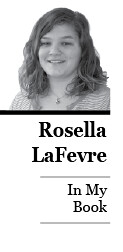Columnist Rosella LaFevre digs into the struggles of the character in “Long Run Short Catch.”
Many of us, I believe, have asked the question, “Why me?” When we face tough situations, we wonder why those things had to happened to us. I am sure I’m not the only one who has begged for an answer to this question.
Asama Iwuoha, a Nigerian-American and the author of the self-published memoir “Long Run, Short Catch: One Woman’s Desperate Attempt to Discover If Normalcy Actually Exists on Earth,” posed this question on the first page of her book.
Iwuoha’s memoir encompasses the sexual abuse she suffered as a child and her years as a Temple student, where she met the man she eventually married. She wrote that from the start she has never found the answer to this question.
In her book, Iwuoha recalled the time her mother discovered her father sexually abusing her and called the police. When her father returned from prison to live with the family, Iwuoha had to learn to deal with his presence. Understandably, she continues to hold a grudge against him, getting fancy clothes and accessories out of him out of forgiveness and finally, she marries a Jamaican man to spite him.
Sometimes, when we ask the question, “Why me?” we seek to absolve ourselves of any guilt, as did Iwuoha. She asks the question without pausing to consider that perhaps her ill-fated marriage happened because she chose to marry a man for the wrong reasons.
As a sophomore at Temple, Iwuoha was finally fitting into a group of girls. One of them introduced her to Michael Williams, a polite Jamaican man. He immediately took a shine to her despite being more into light-skinned girls, as Iwuoha’s account tells us.
His father had brought him to America using someone else’s passport. Advised by his father that marriage would be the quickest way to solve his problems, Williams recognized that Iwuoha could solve his problems and he set out to marry her.
Action was taken so that he might go to college, but it caught up to him when a student enrolled at Temple with the same Social Security number. That was when his father told him he must find a woman to marry and soon after, he met Iwuoha.
They started dating, and he later told her his dilemma. Unsure, she said she’d think about marrying him.
“Is it possible he just wants to use me as his ticket?” Iwuoha wrote. “Either way, marrying him could be my final valediction from father.”
The outcome of the situation is surely undesirable, but this could be the very answer to the Iwuoha’s question.Why should her marriage end the way it did? Perhaps because, as much as Williams was using her for a green card, she was using him to get back at her father.
Often, we beg the question, “Why me?” because we hope that should the answer come to us one way or another, that it will give meaning to our suffering.
Perhaps Iwuoha’s supposed inability to find her answer is because in writing the book, she sought to answer the questions her family had about the choices she made in life.
“Not only does my book entail many of those answers, but it also served as my catharsis, releasing me of emotional baggage that had been haunting me,” Iwuoha said of why she chose to self-publish her story now.
Ultimately, Iwuoha’s book raises more questions for the reader than it answers, but this could be considered its greatest charm. By questioning Iwuoha’s actions, reactions and feelings, we learn that sometimes the answer we’re looking for is right there. And sometimes, it’s not so important why you suffered as how you championed that suffering.
Rosella LaFevre can be reached at rosella.lafevre@temple.edu.


Be the first to comment